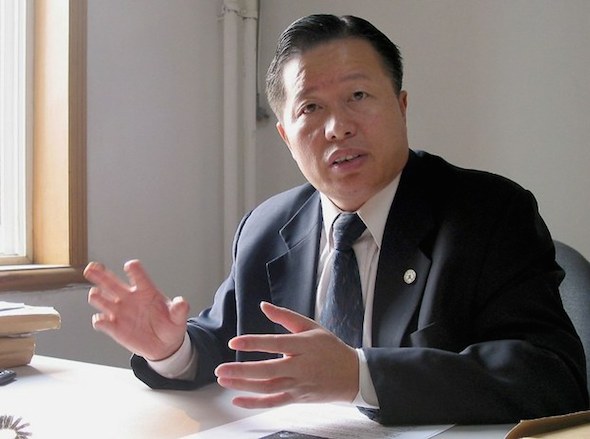Jail Term of China’s Human Rights Lawyer to End in August
Radio Free Asia

Jailed human rights lawyer Gao Zhisheng, one of China’s highest-profile dissidents, is scheduled to complete his three-year prison term at a remote jail in China’s northwestern region of Xinjiang in early August, amid concerns by some activists that the authorities will keep him under extrajudicial detention even after that.
The family of Gao, who has defended clients in politically sensitive cases and spoken out on behalf of members of the banned Falun Gong spiritual movement, have been told that his term in Shaya Prison would end on Aug. 7.
“Of course we are happy that he is finishing his sentence,” Gao’s father-in-law Geng Yunjie told RFA. But he said it was unclear what “concrete arrangements” the authorities had in mind after Gao completes his term.
Gao has only been allowed two visits from relatives, the last in January 2013, and his relatives have little knowledge of his state of health, Geng said.
“The first time I saw him he was still quite overweight, and the second time I saw him he was pretty thin, and his mouth looked very dry and cracked,” Geng said.
During the 30-minute meeting on Jan. 12, 2013, Geng said he had asked Gao about his health, but hadn’t been able to hear his replies clearly through the phone-like connection between visitors and inmates.
Gao’s brother Gao Zhiyi said the whole family hopes that he will be released, after having no news of him for more than a year.
“We have repeatedly asked to visit him,” Gao Zhiyi said. “But after a while I stopped trying to contact the authorities because it was pointless.”
“No one knows the real situation … we have had no news at all,” Gao Zhiyi said.
“I’d be lying if I said we weren’t worried, but what does it matter what we say? The family just wants to see him freed as soon as possible,” he said.
‘Not optimistic’
Beijing-based rights activist Hu Jia said there were concerns among China’s civil rights community that the completion of Gao’s jail term may not be straightforward.
“He was supposedly free before, and yet the authorities were holding him in a secret location out of contact with the rest of the world,” Hu said. “That’s why we’re not optimistic this time.”
He said the authorities may decide to whisk Gao off into secret detention when his term is up, given the sensitive nature of the cases he defended.
“Gao Zhisheng will be stripped of his political rights for at least one year even if he is released, so he may be held under surveillance or have limited freedom,” Hu said.
“He may be sent back to his hometown in northern Shaanxi province, or he may be sent back to Beijing via Urumqi; any of these things could happen.”
Once a prominent lawyer lauded by the ruling Chinese Communist Party, Gao fell foul of the government after he defended some of China’s most vulnerable people, including Christians, coal miners, and followers of the banned Falun Gong spiritual movement.
In 2006, the Beijing authorities arrested Gao and handed him a three-year jail term for “inciting subversion” that was later suspended for five years. But over the following five years, Gao repeatedly suffered forced disappearances and torture.
In December 2011, China’s official Xinhua news agency said in a terse announcement that Gao had been imprisoned for three years for repeatedly violating his terms of probation.
House arrest ‘likely’
Nanjing-based freelance journalist Sun Lin, who has followed Gao’s case closely for several years, said Gao looked likely to be held under house arrest even after the end of his jail term.
“Based on his high profile and the background of his cases, I think the authorities will place more curbs on him if he is freed than they do on us,” Sun said.
“The authorities will certainly want to keep a very strict eye on him, because of his personality,” he added.
He said China’s nationwide system of “stability maintenance” placed anyone linked to Falun Gong practitioners as the highest priority.
“This is their biggest headache … and they will worry that [Gao] will start activism on his own account,” Sun said. “There are two kinds of imprisonment; one is in jail, and the other is at home.”
Reported by Hai Nan for RFA’s Cantonese Service, and by Xin Lin for the Mandarin Service. Translated and written in English by Luisetta Mudie.
